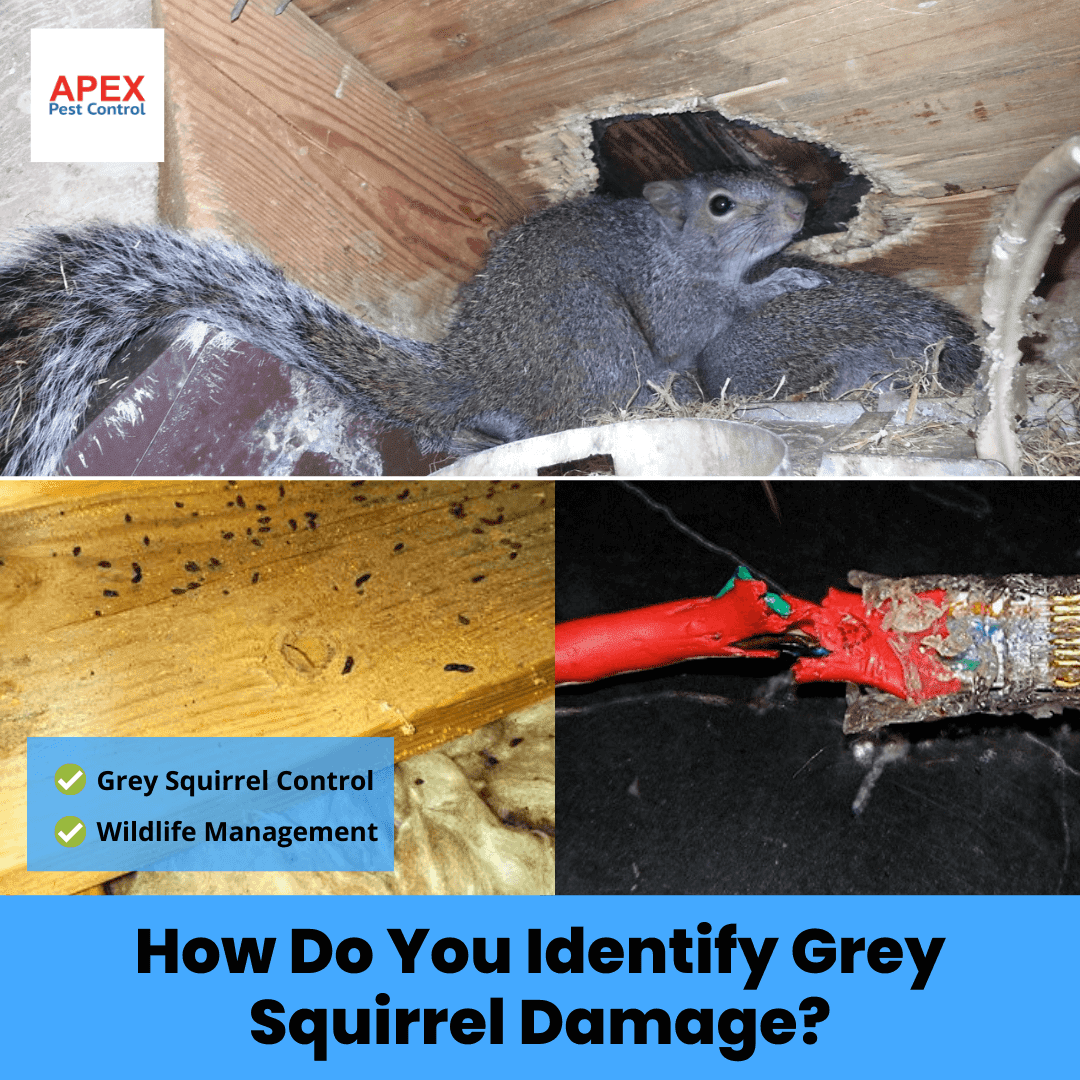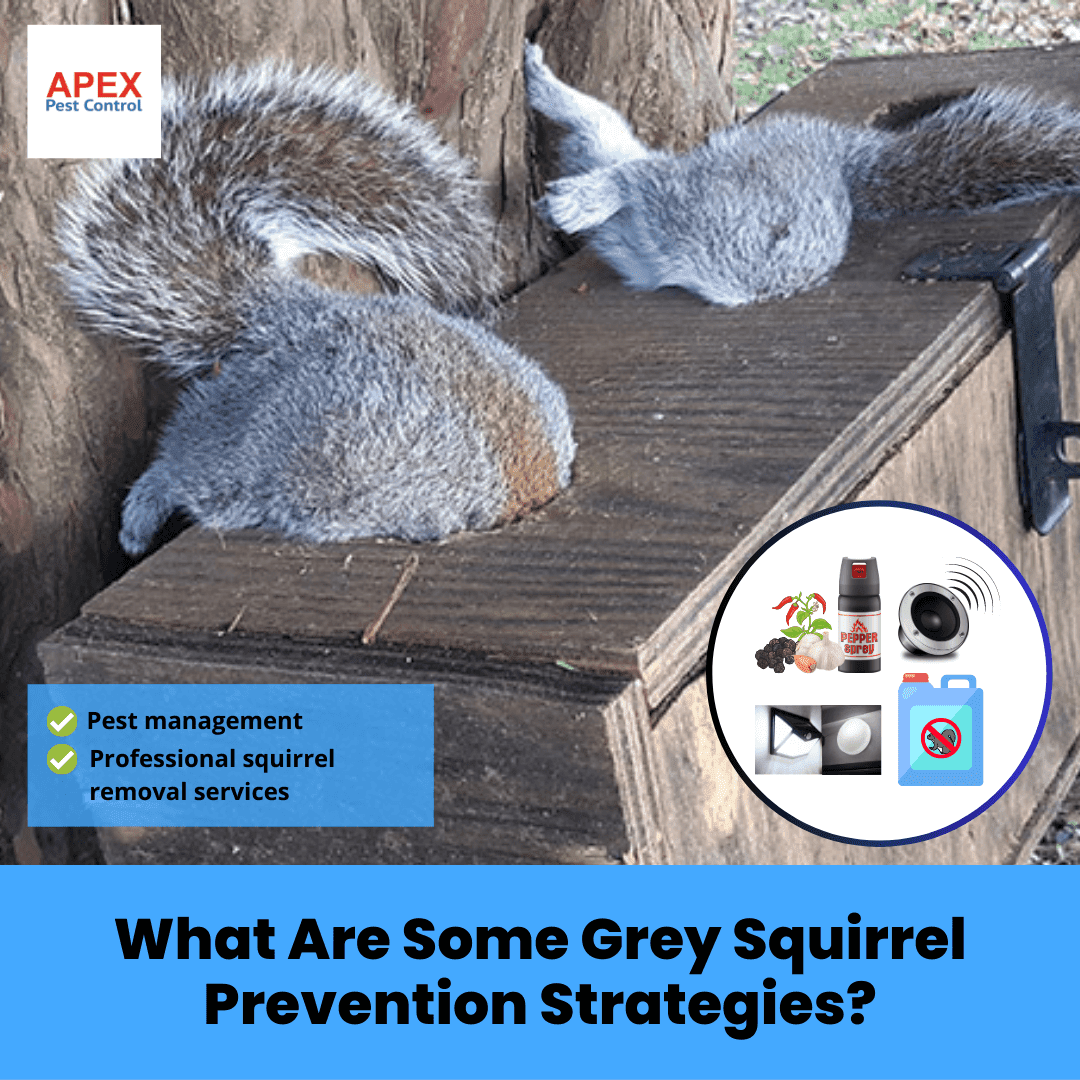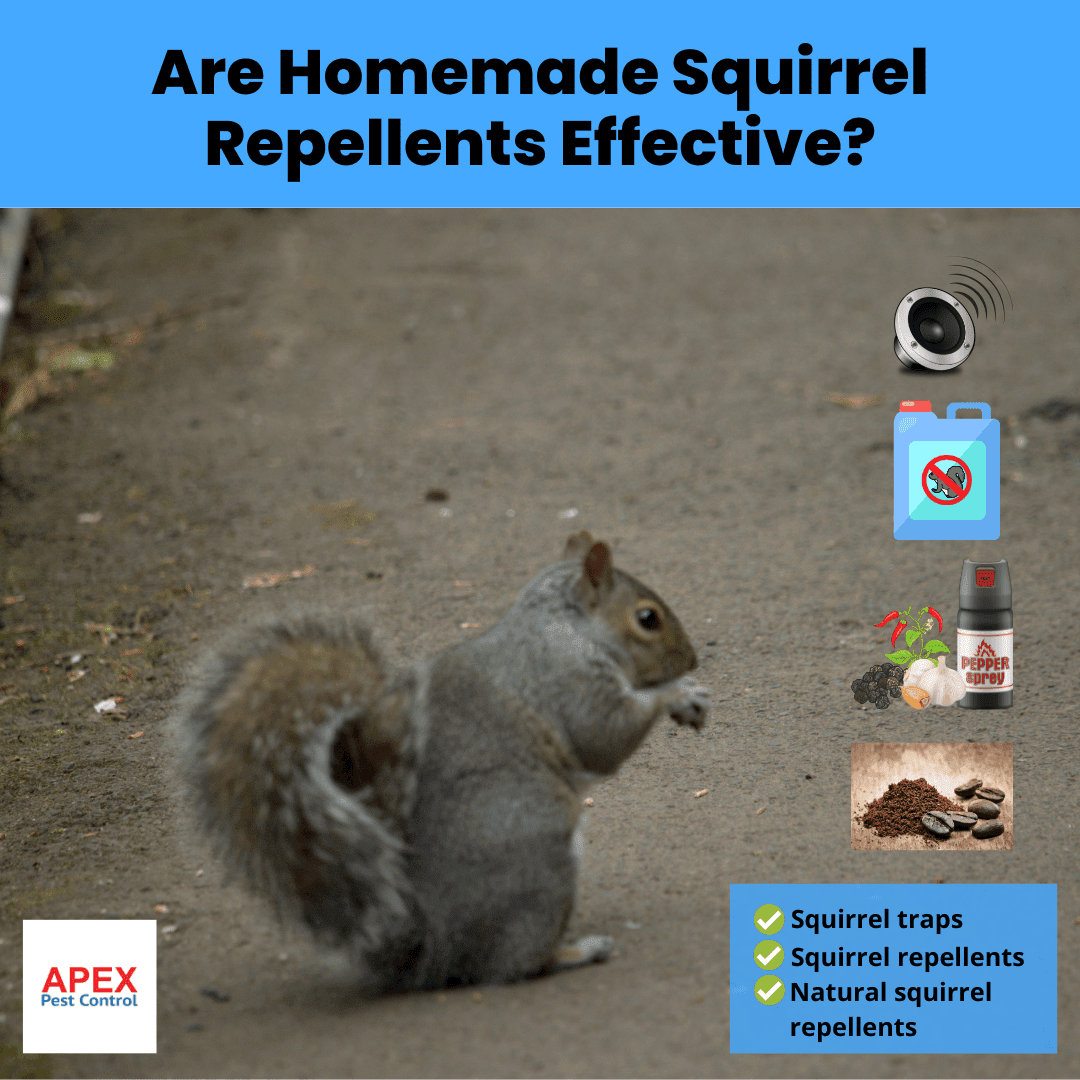How Do You Get Rid Of Grey Squirrels In Your Home?
Grey squirrels are common pests in many areas of the world, and they can be particularly troublesome when they enter a home. But, removing grey squirrels requires careful consideration and should only be undertaken by trained wildlife control professionals or those with experience dealing with these creatures.
Knowing where and how to search for possible entry holes is a key element in developing an effective strategy for exclusion. Appropriate baiting materials, such as peanuts or tree nuts, are also important when attempting to capture and release grey squirrels back into their natural habitat.
This article will provide an overview of the measures that can be taken to remove grey squirrels from a property. Read about potential animal entry points and strategies to evict them from their nest sites humanely. You can also read about prevention methods that may reduce future infestation incidences.
What Are Grey Squirrels?

Grey squirrels, also known as Sciurus carolinensis, are a species of tree squirrel native to North America. Grey squirrels have adapted well to urban environments and can be found in many parks and residential areas worldwide. As expert wildlife control agents know all too well, grey squirrels may become pests when they enter homes or other structures in search of food and shelter.
While grey squirrel control is not easy, it is possible with professional grey squirrel control services such as trapping, exclusion methods, and habitat modification.
Professional pest controllers understand squirrel’s behaviour patterns, which helps them provide successful outcomes for clients who wish to get rid of these nuisance rodents quickly and humanely from their property. Read more on how to get rid of grey squirrels from the attic here.
How Do You Identify Grey Squirrel Damage?

Signs of an infestation from grey squirrels typically include the presence of droppings and gnawed holes in wood, plastic, and other materials. Homeowners can identify grey squirrel damage by looking for shredded nest material and chewed insulation in attics and walls. The presence of trails leading up to and away from potential nesting sites may indicate grey squirrel activity.
Damage to the exterior of buildings often signals an infestation, as grey squirrels often chew on siding and other materials to gain access to areas they want to inhabit.
What are the Signs Of Squirrel Infestation?
The presence of grey squirrels in your home can cause serious damage and should be addressed quickly. Entry holes are a major sign that grey squirrels may be present, as these rodents chew through wood and other materials to gain entry into an attic or wall void. Grey squirrel populations can often be confirmed by finding droppings in attics, crawlspaces, basements, garages, storage sheds, etc.
It is also important to recognise any other structural damage they may have caused, such as gnawed electrical wires, which could create fire hazards if not properly taken care of. Once you have identified the presence of grey squirrels in your home, live traps can be used for trapping them without harming them since this species is protected under U.S. law.
How Do You Know if There Are Squirrels in Your Home?
Bird feeders near windows and other areas can be a prime spot for ground squirrels to access, leading to potential entry points into the home or business. Chewed holes around eaves and soffits could also indicate that they have gained entrance and live within walls, lofts, or attics. In addition, the wiring should be checked for chewed insulation, as this may lead to further problems, such as fire hazards if left unchecked.
What Are Some Grey Squirrel Prevention Strategies?

Home modifications such as sealing all access points, including vents, chimneys, and openings around pipes and wires, can effectively prevent grey squirrels from entering a home. Also, using motion-activated lights, loud noises, and strong scents can also deter squirrels from entering a home.
Traps are another option for preventing grey squirrels from entering a home. However, they should only be used as a last resort, as they can be dangerous and potentially inhumane. It is important to note that, regardless of the chosen prevention strategy, it is essential to keep the area clean and free of food sources to reduce the chances of a grey squirrel entering a home.
What Home Modifications Can You Add to Deter Squirrels?
Home modifications are an effective prevention strategy for dealing with grey squirrels. It is important to identify any potential entry points, such as attic or loft spaces, basements, and small holes in the walls of a home.
Once these have been identified, using wire mesh to block off entrance holes from the outside may be beneficial. Additionally, motion-detecting devices can also be installed around your property to act as early warning systems that detect pest activity and alert you when there is a risk of squirrel population growth.
In addition to blocking access points, protecting your plants is another key element of successful grey squirrel prevention strategies. Planting shrubs and trees away from the house can help create physical barriers between them and the structure itself.
Can You Use Visual Deterrents to Control Squirrels?
Deterrents can be just as effective as a home modification when preventing grey squirrels from entering a property. Metal flashing or poles can be installed around the building’s entry points or crawl spaces to prevent squirrels from gaining access. This is particularly useful for outbuildings that do not have solid walls.
Additionally, using squirrel repellents such as predator urine or scent-based products may help deter them from your garden or yard. These deterrents should be regularly maintained and monitored for best results to ensure their continued effectiveness against potential infestations.
Are Homemade Squirrel Repellents Effective?

Homemade squirrel repellents are a cost-effective alternative to more expensive store-bought repellents. Many homeowners attempt to make their repellents using everyday household items, such as hot spices and ammonia, in order to keep squirrels away from their yards and gardens. But how effective are these homemade repellents?
The effectiveness of homemade squirrel repellents is a highly debated topic. Hot peppers, ammonia, coffee grounds, and other strong odours can effectively deter squirrels. However, these repellents only work briefly and must be regularly reapplied. In addition, the success of homemade repellents depends on the type of squirrels present, as the smell of certain repellents may not deter some.
It is possible to use homemade repellents to deter squirrels from your property. However, the effectiveness of these repellents is variable, with some repellents only working for a short time or having limited success in deterring certain types of squirrels.
For this reason, it is important to research and experiment with various repellents to find the best solution for your particular squirrel problem.
If you cannot successfully prevent squirrels from entering your home, spring traps effectively capture individual animals who venture too close for comfort. However, because most states require permits for live trapping and relocation activities, it is important to check local regulations before attempting this method.
How Effective Are Store-Bought Squirrel Repellents?
Store-bought squirrel repellents can be effective in removing grey squirrels from your garden. Pest management relies on various techniques to control the population of wild animals, and many products are available for purchase that may help homeowners manage their problems with these rodents.
When choosing a product for controlling the presence of squirrels around plants or other areas in your garden, it is important to consider how safe it is for other animals and pets in the area. Many common store-bought animal repellents rely on strong odours like garlic. When used properly, these methods should not harm non-target species but might require frequent reapplication after rain or heavy winds.
Should You Call Professional Squirrel Removal Services?
Getting rid of grey squirrels from your house can be a difficult challenge. Dealing with these foreign species requires much knowledge in pest control to guarantee a secure and successful removal. It is essential to comprehend the complexity of the situation and have the proper skills to execute the task.
The best way to get rid of squirrels is by hiring the services of a professional wildlife control expert. These experts have the experience and knowledge to develop an effective plan for removing squirrels from your attic or roof space while ensuring they are caught alive and released appropriately away from your property. They also understand how to identify potential entry points that could lead to future invasions.
Should I Let Professionals Do The Trapping And Removal?
As a homeowner, you may wonder if it is worth it to enlist the services of a professional to handle the trapping and removal of squirrels from your property. The answer is yes. Professional squirrel removal services are designed to safely and humanely remove squirrels from your property and provide long-term solutions to prevent them from returning.
Professional squirrel control services can help identify the type of squirrels on your property, develop an effective removal plan, and safely trap and relocate the animals. Professional services are also experienced in preventing future infestations by taking steps such as removing food sources, sealing entry points, and setting traps. Professional squirrel removal services also have the equipment, such as traps and repellents, to safely and humanely remove squirrels from your property.
In addition to humanely removing the squirrels, professional squirrel removal services also know about local regulations regarding squirrel trapping and removal.
By enlisting the services of a professional, you can be sure that you comply with all laws and regulations related to squirrel trapping and removal. Professional services often offer a warranty on their work, so you can be sure your home is protected from future infestations.
Overall, enlisting a professional’s services for trapping and removing squirrels from your property is beneficial. Professional squirrel removal services are familiar with the types of squirrels on your property, can provide a safe and effective removal plan, and are knowledgeable about local laws and regulations.
What Are Some Effective Squirrel Deterrents?

When it comes to dealing with pesky grey squirrels in the home, prevention is key. Taking measures such as digging holes and using chicken wire can help to prevent them from entering your abode in the first place. Investing in a fruit cage or artificial decoy birds may also fool furry critters into thinking they’ve reached an incorrect destination.
Ensuring all openings into the attic or other areas are properly sealed with hardware cloth or caulk is important. Additionally, squirrel-proof bird feeders should be used if you have birds on your property to reduce the number of foraging opportunities available to these animals. Ultimately, the best approach to rid yourself of grey squirrels is through proactive steps, including blocking potential entry points and having deterrents before attempting more aggressive means of control. By taking these precautions, you should be able to keep your home free from unwanted guests in no time.
What Are The Natural Predators Of Grey Squirrels?

Grey squirrels are an invasive alien species, threatening native red squirrel populations. They consume large quantities of nuts, which can cause problems for other wildlife and humans. They are common in backyards, parks, and woodlands, where they feed mainly on nuts, buds, and berries. While these animals are cute and playful, they can also wreak havoc on their environment if their population is unchecked.
The natural predators of grey squirrels are primarily birds of prey, including hawks, falcons, and owls. Other predators include foxes, weasels, coyotes, racoons, and snakes. Some of these predators will actively hunt grey squirrels, while others may scavenge their remains after dying.
The presence of predators helps keep the grey squirrels’ population balanced. If the predators are removed from the area, the grey squirrels may be able to overpopulate and cause significant damage to their environment. It is important to maintain a healthy population of predators in the area to prevent this. This can be done by preserving their habitats and protecting them from human interference.
Are Grey Squirrels Helpful To Have Around Your Home?

Grey squirrels are popular in many neighbourhoods worldwide due to their ability to adapt and thrive in urban areas. Unlike other tree squirrels, such as red squirrels, they are native species known to feast on sunflower seeds, tree branches, and hanging bird feeders.
Although they can cause some damage to fruit cages and other garden fixtures, they are generally seen as a welcome addition to the native wildlife in a neighbourhood.
The presence of grey squirrels in a yard or neighbourhood can be beneficial for various reasons. They often help to reduce the numbers of other, more harmful wildlife.
Furthermore, they can be an important food source for birds, especially when food is scarce in the winter. The grey squirrel is also known to be a good climber and can help fetch food from high tree branches that other animals may be unable to reach.
Not only can grey squirrels chew through wood and siding, but they can also wreak havoc on your garden and flowerbeds by digging and eating the plants. They are known to dig holes in trees and chew on branches, causing extensive damage to your landscaping.
Additionally, they can create a mess by scattering debris and leaving droppings all around your property. Grey squirrels can be helpful around the home, especially if you are looking for a natural form of pest control.
They can provide an important food source for other wildlife and help protect your garden from more dangerous creatures. However, it is important to keep bird feeders and other food sources out of the reach of squirrels to prevent them from becoming overly dependent on humans.
However, it is important to remember that these benefits come with risks, and it is important to consider them before deciding whether to allow grey squirrels to remain around your home.
What Are Some Long-Term Solutions For Your Squirrel Problem?

Wildlife control is the best way to get rid of grey squirrels in your home. However, it’s important to ensure that no food sources are available for them.
Bird baths, feeding stations, and washing lines should be removed from around your property, as these provide an easy source of water and shelter for the squirrels.
Fruits and vegetables should not be left outside or near any entry points into the house – this includes windowsills and doorframes, as well as sheds, garages, or outhouses where they can find a food source.
Lawn care is also essential to prevent grey squirrels from entering your home. Soft shoots attract them, so keeping your lawn regularly mowed and removing fallen leaves quickly is important to avoid attracting their attention.
Insulation foam may need to be installed in roof spaces if they have managed to gain access inside walls or attics, but this should always be done by a professional wildlife control expert who knows how to do it safely and correctly.
Finally, it’s recommended that you contact a local wildlife control specialist if you cannot solve the problem yourself. Taking steps such as sealing off potential entrance points with wire mesh or installing motion-activated lights will help deter the squirrels from returning – ensuring your home remains safe from unwelcome guests.
Want to Know How to Get Rid of Grey Squirrels? Call the Professionals for More Tips

Getting rid of grey squirrels in your home can be a tricky task. While several home remedies and commercially available products help you out, it is important to understand how these animals behave to remove them from your home effectively.
Humane trapping techniques, such as using live traps, are the most effective way to remove grey squirrels from your property without causing them any harm.
Additionally, it is important to be mindful of any access points they may have to your home and make sure to close them off. Understanding the local laws and regulations governing squirrel removal is important, as some activities may be prohibited. With the right knowledge and preparation, you can successfully get rid of grey squirrels in your home.
Frequently Asked Questions
Does the Law Protect Grey Squirrels?
In the United States, grey squirrels are considered an invasive species and are not protected by federal law. However, many states have enacted laws to protect them from being killed or trapped.
Generally, these aim to encourage squirrels to relocate rather than eliminate them. Additionally, certain counties have enacted their own laws, which can further protect grey squirrels from elimination. As such, grey squirrels in the United States may be protected from elimination depending on the state or county in which they are located.
Is It Safe To Use Poison To Get Rid Of Grey Squirrels?
Poison is often proposed when attempting to control grey squirrel populations. However, it should be noted that this solution is both ethically and legally controversial. Poisoning wildlife can lead to serious environmental damage if not done correctly and should only be used as a last resort after all other methods are exhausted.
Furthermore, users must be familiar with applicable laws protecting grey squirrels before deciding on poison. Some species may be protected by law and thus have restrictions when controlling them.
How Can I Discourage Grey Squirrels From Coming Near My Home?
To discourage grey squirrels from coming near your home, it is important to remove or reduce food and shelter sources that may attract them. This includes:
- clearing away fallen fruit or nuts around the yard,
- ensuring garbage cans are securely fastened
- removing bird feeders close to your house
- trimming tree branches that provide cover & nesting sites
- and ensuring pet food is not left outside overnight.
Additionally, installing motion-activated sprinklers will help deter animals from entering the area by startling them with bursts of water.
How Can I Discourage Grey Squirrels From Eating My Plants?
Grey squirrels can be a nuisance when they eat plants, as many gardeners and homeowners are familiar with. One of the most effective strategies for discouraging grey squirrels from eating plants is creating a barrier around them.
This could include erecting a fence or netting, which should be tall enough to prevent access from above and below. Additionally, you may wish to use chemical repellents such as pepper sprays or animal urine-based products on affected areas to discourage further visits by grey squirrels.
Are There Humane Ways To Get Rid Of Grey Squirrels?
Trapping and relocation are the most effective ways to remove these animals from your property without causing any harm. Additionally, repellents may be used in certain situations to discourage them from entering an area where they no longer belong.
Habitat modification can also be employed by removing potential sources of food and shelter, thus making space less desirable for the animal to inhabit.

Tony Johnson, Founder & Lead Technician at Apex Pest Control, is a BPCA and NPTA accredited pest management expert with over 35 years’ hands-on experience. Tony specialises in Integrated Pest Management and ensures all services comply with UK pest legislation, including the Wildlife and Countryside Act 1981 and COSHH Regulations 2002. His commitment to continual learning and adapting to industry best practices means clients receive effective, safe solutions for pests affecting homes and businesses across South Yorkshire. Tony’s dedication to professional standards, ethical treatment methods, and local expertise has made him a trusted partner for pest control and prevention.
-
BPCA & NPTA accredited | CHAS certified
-
Committed to UK pest law compliance & safety
-
Focused on effective, ethical pest management for South Yorkshire


